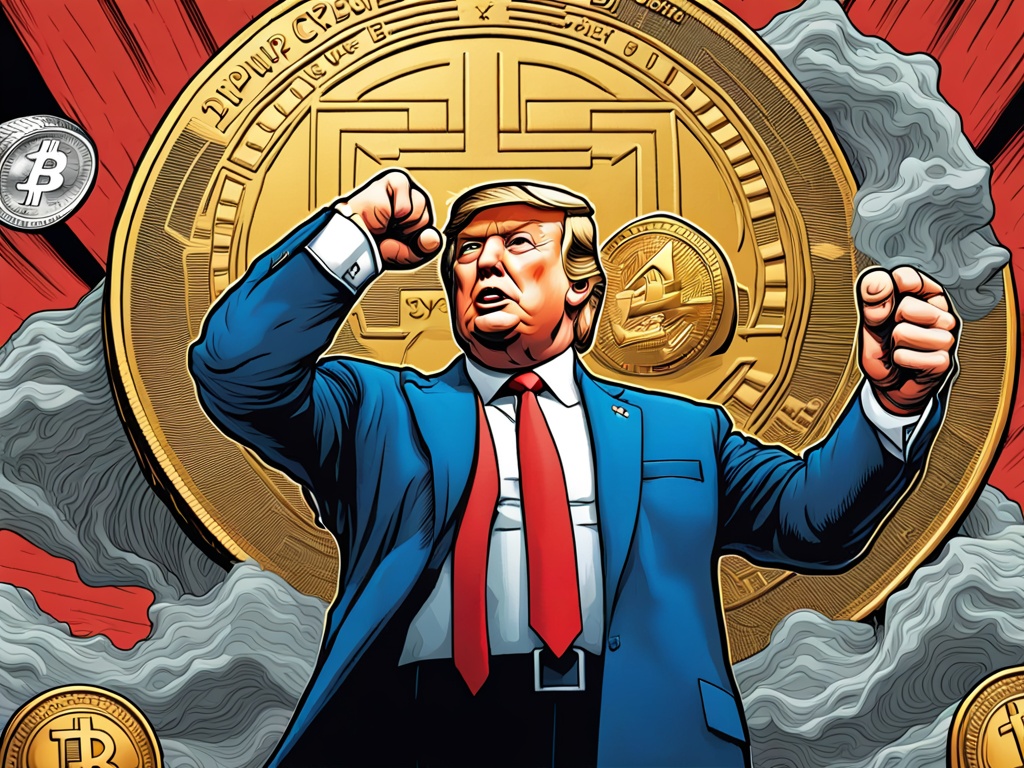Trump Unveils $TRUMP Coin Amid Controversy 🪙
As Donald Trump steps in as the 47th president of the United States this year, he has taken an unexpected initiative by introducing his own cryptocurrency known as the $TRUMP coin. This move comes in stark contrast to his previous skepticism towards digital currencies, where he has recently proclaimed that the U.S. would emerge as “the crypto capital of the planet” with his return to the political scene.
The chronology of this cryptocurrency release has generated mixed reactions. Critics accuse Trump of exploiting his upcoming presidency to earn from the growing trend of cryptocurrencies, with a particular focus on meme coins. Nonetheless, specialists are examining the potential ramifications of Trump’s actions on active legal disputes in the crypto realm, especially concerning the notable lawsuit between Ripple Labs and the U.S. Securities and Exchange Commission (SEC).
Ripple Legal Battle: Implications of Trump’s Cryptocurrency 🚀
Attorney Bill Morgan has recently elaborated on how Trump’s announcement may influence the ongoing lawsuit involving Ripple. He remarked that the appeal regarding Judge Torres’ decision against Ripple’s fair notice defense is looking increasingly hopeful. To provide some context, the SEC is in litigation against Ripple, alleging that the sale of XRP constitutes a violation of securities regulations. Ripple, however, contends that it had no definitive indication that its XRP sales were subject to registration requirements set forth by the SEC.
Highlighting Trump’s perspective on cryptocurrencies, Morgan noted that although the president is promoting the $TRUMP meme coin, he does not classify such coins as investment contracts necessitating SEC oversight. This distinction holds significant weight in the Ripple case, where the SEC maintains that XRP should be classified as a security, contrasted with Ripple’s assertion that it is merely a digital asset.
The appeal of Judge Torres’s finding against Ripple’s defense related to the necessity of a contract or post-sale obligations appears to be promising.
If the President believes a token can be issued and promoted without post-sale obligations to buyers, it raises essential questions regarding the regulatory framework surrounding such actions.
In this context, Morgan emphasized the implications of Trump issuing a speculative meme coin without aligning with the conventional regulatory structures enforced by the SEC on other cryptocurrencies. He articulated doubts about how the ongoing SEC versus Ripple case can hold up under these new conditions, asserting that both Ripple’s sale of XRP and the launch of the $TRUMP coin lacked any post-sale obligations, a central point of dispute within the Ripple legal framework.
Understanding the Ripple Case and Its Future 🔍
The Ripple lawsuit, ongoing for several years, has caught the attention of investors and legal experts alike. The SEC’s claim rests on the argument that Ripple’s XRP token qualifies as a security and should be regulated accordingly. The stakes in this case are substantial, not only for Ripple but for the entire cryptocurrency industry, as the precedent set here could reshape the regulatory landscape for digital assets.
- Key issues in the case include:
- The definition of a security in the context of digital currencies.
- The necessity of clear communication and notice regarding regulatory obligations.
The role of major political figures like Trump can ostensibly influence public and regulatory opinion on cryptocurrency classifications. With Trump actively promoting his token, the conversation around what constitutes an investment versus a simple digital currency may evolve further.
Hot Take: The Future of Crypto Regulation 🌐
The developments surrounding the $TRUMP coin and the Ripple lawsuit indicate a transformative period for cryptocurrency regulations in the United States. As political figures engage directly with the crypto space, creating tokens that challenge existing regulations, the lines between politics and financial technology can blur.
Ultimately, it remains to be seen how this intricate dance between emerging currencies and established authorities will unfold. As you observe these developments, continue to consider the implications they may have on the broader landscape of cryptocurrencies.





 By
By
 By
By
 By
By
 By
By
 By
By